Review by New York Times Review
Without presuming to analyze them, Kalb presents psychological profiles of a dozen iconic figures. Was Andy Warhol a hoarder? He crammed his Manhattan townhouse with collectibles and debris, ranging from a Picasso to 175 cookie jars. By the time he died he was living mainly in his bedroom, while the rest of his dwelling served as a storage closet. Recent research, we learn, says that hoarding is distinct from but related to obsessive-compulsive disorder. The architect Frank Lloyd Wright was propelled to world fame by an ego the size of a skyscraper. He neglected his family, and built houses that leaked and a Manhattan museum that evoked protests from the artists whose works it was designed to showcase. "Conventional rules" quite simply "didn't apply to him." Kalb notes that people with narcissistic personality disorder "see nothing wrong with their behavior, nor do they recognize its impact on others." History's great statesmen and thinkers were not immune to mental affliction, either. We know Dostoyevsky was a compulsive gambler. But did Darwin suffer from an anxiety disorder and Lincoln from depression? Was Einstein "on the autism spectrum"? "A mental health assessment is subjective," Kalb points out, so we'll never know for sure. But she believes that when certain dispositions and symptoms intersect with the right aptitudes, they may fuel creativity, compassion and even genius.
Copyright (c) The New York Times Company [February 7, 2016]
Review by Booklist Review
*Starred Review* Science- and health-journalist Kalb selects a dozen notable historical figures, applies diagnostic tools pulled from the American Psychiatric Association's Diagnostic and Statistical Manual of Mental Disorders (DSM) to their unique personality traits, and produces a diverting reader's digest of biographies that focus not so much on their lives but on their quirks. Although she acknowledges that mental illness and genius might seem mutually exclusive, she also makes a strong case supporting the fact that occasionally mental illness can actually enhance brilliance. For example, she advances a theory that Abraham Lincoln's chronic melancholy (what the DSM calls clinical depression) actually made him a stronger, more determined and pragmatic leader. It certainly would speak to Lincoln's personal grit to pull himself from the morass of despair in order to lead the country in a time of immeasurable turmoil. As for Princess Diana and her struggle with bulimia, it was torment for her, but her candor about it helped millions of eating-disorder sufferers. In all, Kalb's well-written exercise in applying modern psychiatric theory to historical figures, from Marilyn Monroe to Albert Einstein to Charles Darwin, certainly makes for some very entertaining armchair speculation.--Chavez, Donna Copyright 2016 Booklist
From Booklist, Copyright (c) American Library Association. Used with permission.
Review by Publisher's Weekly Review
Kalb examines a diverse collection of 12 notables, including Marilyn Monroe and Albert Einstein, who suffered, or may have suffered, from mental health conditions. According to Kalb, Monroe purportedly had borderline personality disorder, Andy Warhol was an inveterate hoarder, and famed architect Frank Lloyd Wright exhibited narcissistic personality disorder. While Kalb can definitively describe the mental health conditions of some of the more contemporary figures-Betty Ford (alcoholism), Princess Diana (bulimia nervosa)-she needs to resort to speculation on historical figures, and the language suffers from the necessary caveats: Abraham Lincoln "likely suffered from clinical depression"; "it could be argued" Charles Darwin had anxiety; "Was Einstein on the autism spectrum?" Kalb's training as a journalist, not a psychiatrist, occasionally shows in less than clinical descriptions: "People with depression... are wired for despondency." Still, Kalb fruitfully employs diverse sources, including psychology studies and published biographies, to tell the undeniably fascinating stories of her subjects. This is an informative compilation and it's certain to provide readers with fascinating stories to share about an array of famous names. Agent: Gail Ross, Ross Yoon Agency. (Feb.) © Copyright PWxyz, LLC. All rights reserved.
(c) Copyright PWxyz, LLC. All rights reserved
Review by Library Journal Review
Journalist Kalb (formerly of Newsweek) draws attention to 12 common mental health conditions by describing how each manifested itself in the personality of a historical figure. We learn that Marilyn Monroe probably suffered from borderline personality disorder; George Gershwin may have been afflicted by attention-deficit/hyperactivity disorder; and Frank Lloyd Wright demonstrated signs of narcissism. Individual chapters focus on a specific person and his or her situation, with Kalb first discussing the upbringing that formed their character, then introducing a mental illness, lucidly describing its etiology and manifestations. Drawing heavily on firsthand accounts, the author addresses individual cases, such as Betty Ford's alcoholism. She makes a cogent argument based on what is known of the individual and the condition being described. All in all, readers are left wondering what role the ailments played in the success of these individuals. VERDICT Expect wide appeal. This work will entertain those who enjoy reading about the quirks of the famous as well as inform those who may want to understand the disabilities discussed.-Lydia Olszak, Bosler Memorial Lib., Carlisle, PA © Copyright 2016. Library Journals LLC, a wholly owned subsidiary of Media Source, Inc. No redistribution permitted.
(c) Copyright Library Journals LLC, a wholly owned subsidiary of Media Source, Inc. No redistribution permitted.

